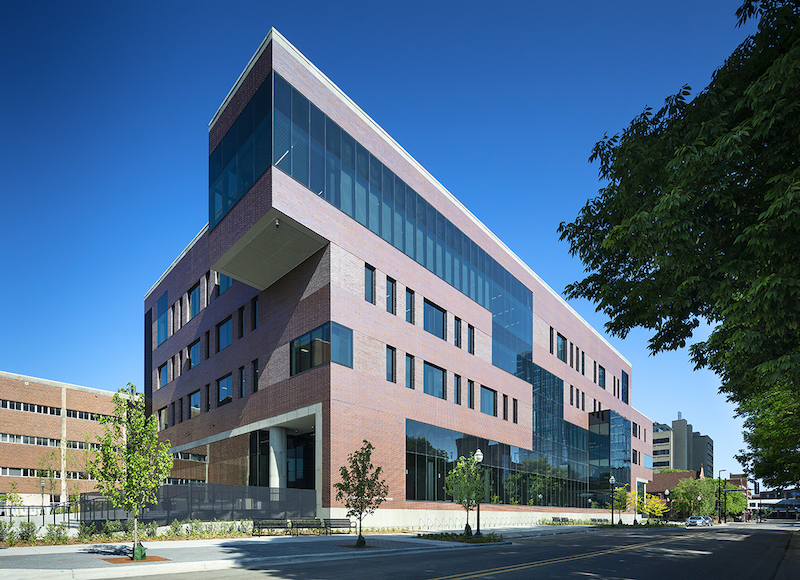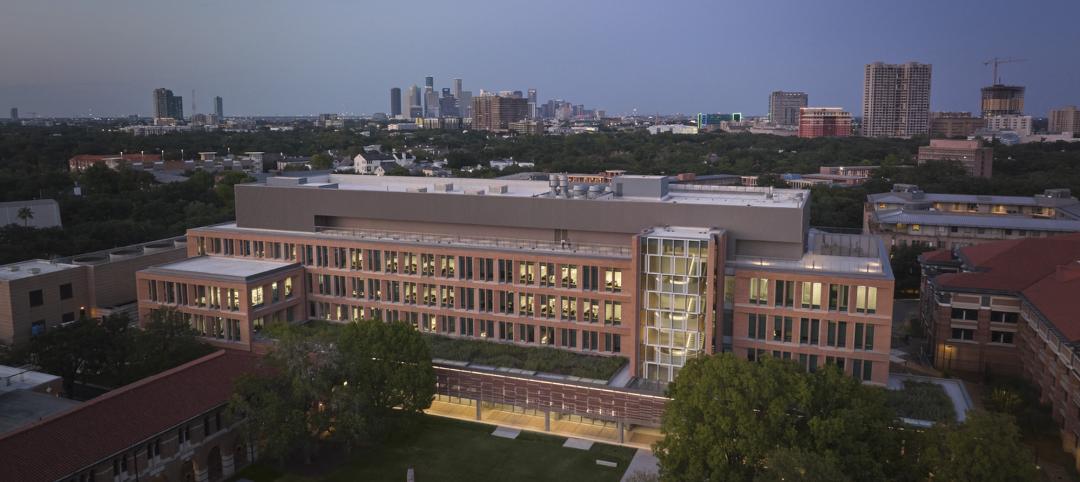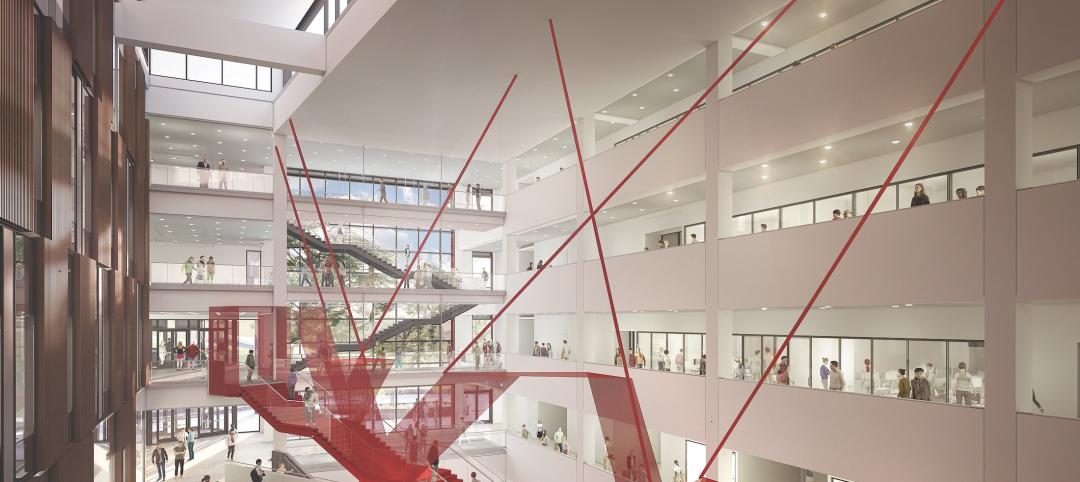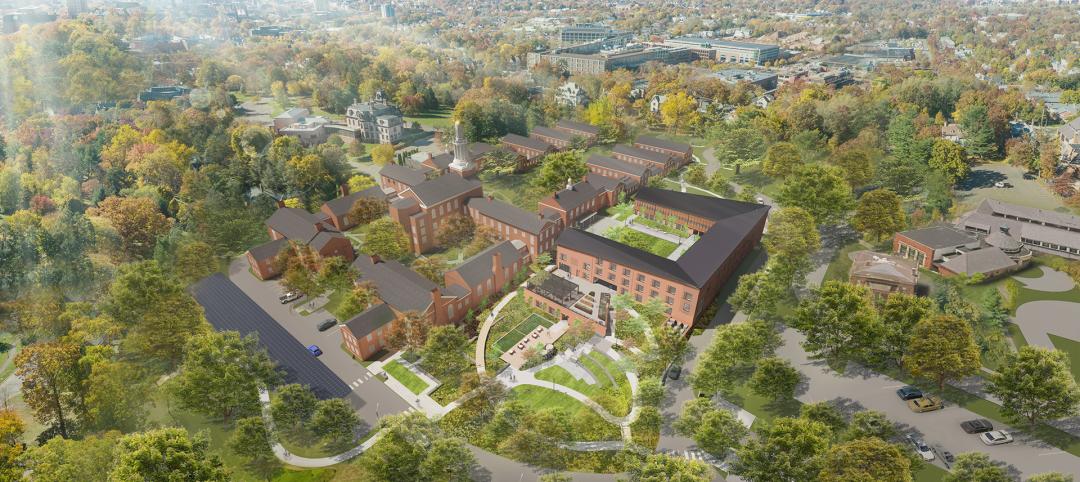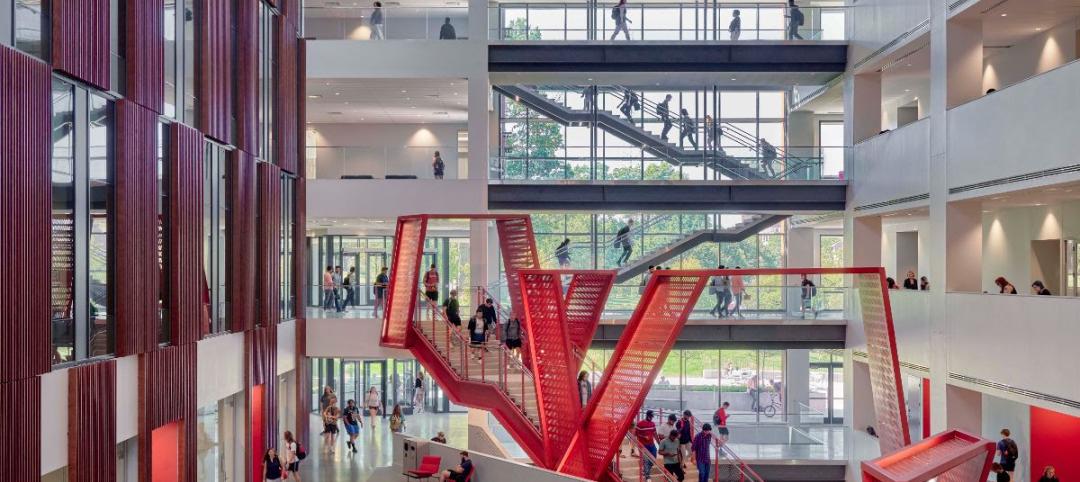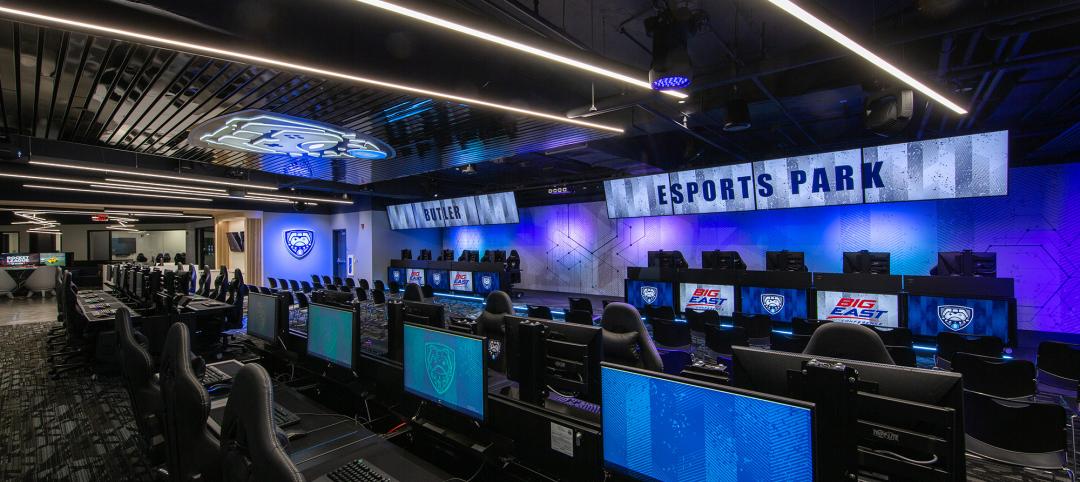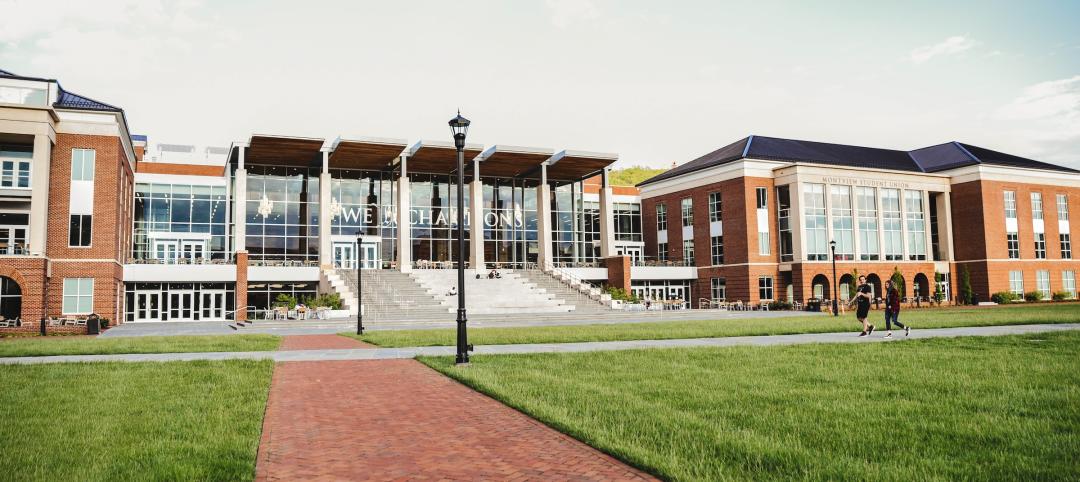The University of Minnesota alumni account for more than 70% of that state’s health professionals. To help prepare the next generation, the university’s Twin Cities campus recently debuted its Health Sciences Education Center, a hub for UM’s health professional schools, and designed to promote interprofessional education and interaction that prioritizes student and faculty well-being.
The 202,000-sf Education Center is positioned to be one of the more comprehensive interprofessional facilities in the country. The project entailed six stories of new construction, and four stories of renovation of an adjacent building. The two structures are connected by portals on four floors.
“The new Health Sciences Education Center is much more than a building; it is a catalyst for change as we prepare the next generation of health care professionals,” says Mark Rosenberg, MD, Vice Dean for education and academic affairs in the Medical School.
Early examples of the Center’s multipurpose utility and transformative potential were evident last summer, when HSEC was used in collaboration with the School of Public Health, Medical School and the Medical Reserve Corps to assist the Minnesota Department of Health in COVID-19 contact tracing. M Simulation—a university team that designs and delivers training experiences for health science students and other stakeholders—also used HSEC’s spaces to train incoming residents and students on personal protective equipment in clinical environments.
REAL-LIFE TRAINING IS PART OF PROGRAMMING
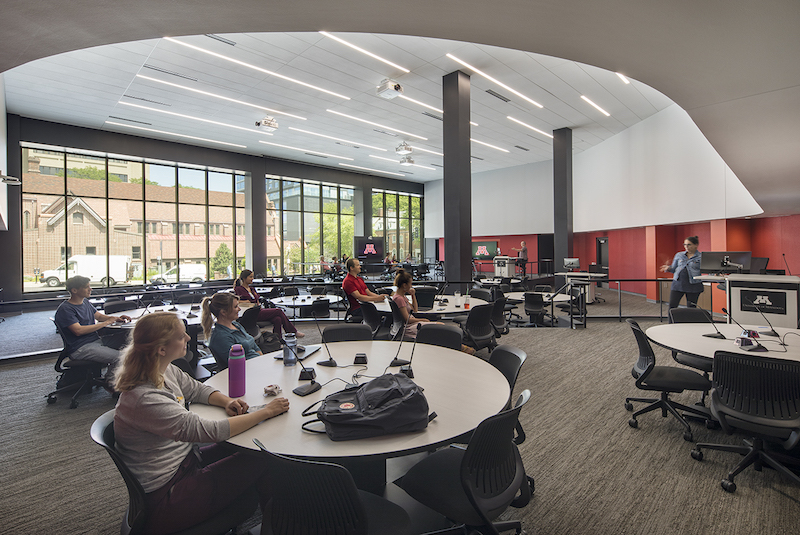
The new HSEC has space for small and large group learning and instruction. Images: Lara Swimmer
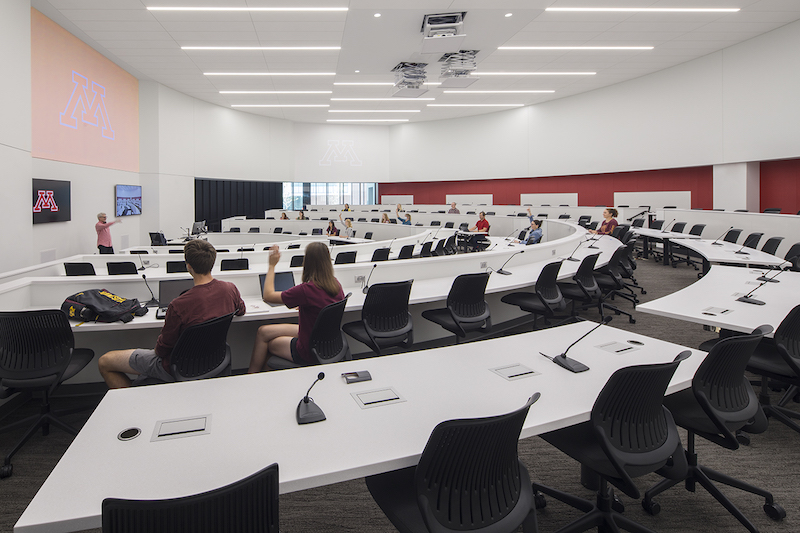
The new HSEC includes:
Center for Health Interprofessional Programs, which connects health professions students from varying disciplines, allowing them to collaborate, network, socialize, and learn;
Biomedical Library and Wangensteen Historical Library of Biology and Medicine, which connects students to healthcare’s history and opportunities for invention and product development that might define the industry’s future, including a makerspace and virtual reality studio;
Simulation Labs on two floors that connect students to the patient experience and the reality of working alongside their interdisciplinary peers. Jakub Tolar, Dean of UM’s Medical School and Vice President of its Office of Academic Clinical Affairs, explains that these labs help prepare students for real-life medical events and crisis, for which “you have to train yourself, almost like an athlete.”
The S/L/A/M Collaborative and Perkins and Will were co-design architects on HSEC. SLAM led this project’s program validation, utilization analysis, building planning, and the documentation of all classrooms, immersive learning environments, and administrative spaces. Perkins and Will, as AOR, provided the exterior and massing design, interior finishes and furniture selection, and public/social space documentation. The Building Team included JE Dunn (GC), IMEG (MEPF), Palanisami & Associates (SE), EVS Inc. (CE), and Sextant (AV consultant).
IN WITH THE NEW
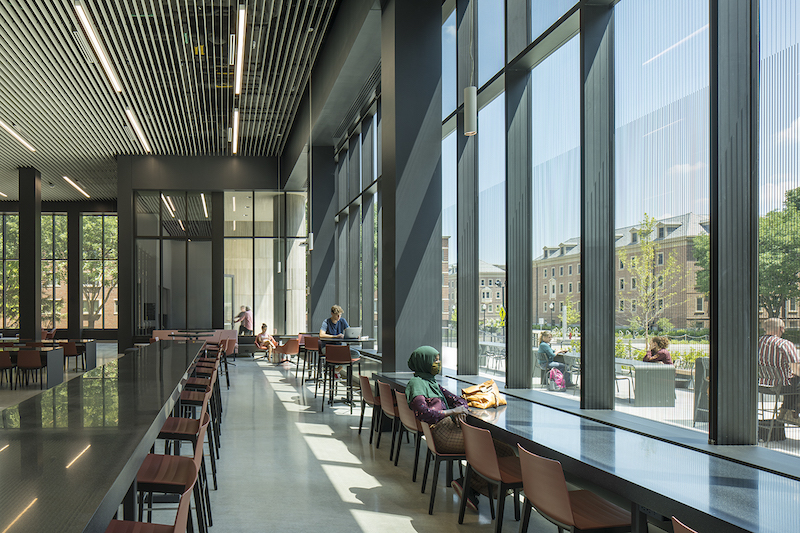
The building's lobbies (above) have lots of seating and natural light. The Center's library features makerspaces and virtual studios. Images: Lara Swimmer, SLAM
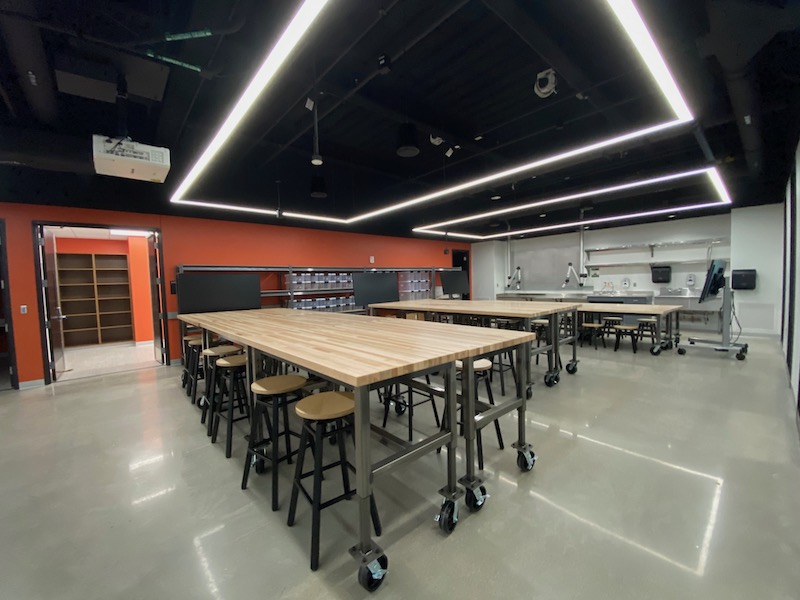
HSEC, which broke ground in February 2018, replaces a four-story brick structure, called the VFW Cancer Research Center and Masonic Memorial Building, that was completed in 1957. The renovated space in the Phillips Wangersteen Building replaces underutilized clinics.
The State of Minnesota invested $66.7 million in construction as part of its 2017 special session bonding bill. The University, along with support from donors, funded an additional $33.3 million in construction costs. Predesign and design from reallocated TCF Bank Stadium bond proceeds totaled $8.6 million. The total cost of the project is $108.6 million, according to the university.
Related Stories
University Buildings | Jan 18, 2024
Houston’s Rice University opens the largest research facility on its core campus
Designed by Skidmore, Owings & Merrill (SOM), the 251,400-sf building provides students and researchers with state-of-the-art laboratories, classrooms, offices, and a cafe, in addition to multiple gathering spaces.
Sponsored | BD+C University Course | Jan 17, 2024
Waterproofing deep foundations for new construction
This continuing education course, by Walter P Moore's Amos Chan, P.E., BECxP, CxA+BE, covers design considerations for below-grade waterproofing for new construction, the types of below-grade systems available, and specific concerns associated with waterproofing deep foundations.
University Buildings | Jan 15, 2024
The death of single-use university buildings
As institutions aim to improve the lives of their students and the spaces they inhabit, flexible university buildings may provide an all-in-one solution.
University Buildings | Dec 8, 2023
Yale University breaks ground on nation's largest Living Building student housing complex
A groundbreaking on Oct. 11 kicked off a project aiming to construct the largest Living Building Challenge-certified residence on a university campus. The Living Village, a 45,000 sf home for Yale University Divinity School graduate students, “will make an ecological statement about the need to build in harmony with the natural world while training students to become ‘apostles of the environment’,” according to Bruner/Cott, which is leading the design team that includes Höweler + Yoon Architecture and Andropogon Associates.
University Buildings | Dec 5, 2023
The University of Cincinnati builds its largest classroom building to serve its largest college
The University of Cincinnati’s recently completed Clifton Court Hall unifies the school’s social science programs into a multidisciplinary research and education facility. The 185,400-sf structure is the university’s largest classroom building, serving its largest college, the College of Arts and Sciences.
Products and Materials | Nov 30, 2023
Top building products for November 2023
BD+C Editors break down 15 of the top building products this month, from horizontal sliding windows to discreet indoor air infusers.
Higher Education | Nov 21, 2023
UPitt at Bradford opens new Engineering & Information Technologies Building
The University of Pittsburgh at Bradford recently opened a new engineering and information technology building that adds urgently needed lab and instructional space to the campus.
Esports Arenas | Oct 10, 2023
Modular esports arena attracts more than gamers
As the esports market continues to grow to unprecedented numbers, more facilities are being developed by universities and real estate firms each year.
Higher Education | Oct 10, 2023
Tracking the carbon footprint of higher education campuses in the era of online learning
With more effective use of their facilities, streamlining of administration, and thoughtful adoption of high-quality online learning, colleges and universities can raise enrollment by at least 30%, reducing their carbon footprint per student by 11% and lowering their cost per student by 15% with the same level of instruction and better student support.
Giants 400 | Sep 28, 2023
Top 80 University Building Engineering Firms for 2023
AECOM, Jacobs, BR+A, and Salas O'Brien head BD+C's ranking of the nation's largest university sector engineering and engineering/architecture (EA) firms for 2023, as reported in Building Design+Construction's 2023 Giants 400 Report. Note: This ranking includes revenue for all university/college-related buildings except student residence halls, sports/recreation facilities, laboratories, S+T-related buildings, parking facilities, and performing arts centers (revenue for those buildings are reported in their respective Giants 400 ranking).


